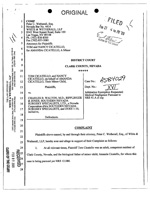Thursday, Jan. 13, 2011 | 2 a.m.
Do No Harm: Hospital Care in Las Vegas, Part 5
- Sun investigation reveals flaws in hospital care; solutions offered
- How to put patients first
- Local hospitals’ willingness to change culture would be a step toward better care, transparency
- ‘You can’t kill my mother and get away with it’
- We must adopt a culture of sincere care
- How to file a complaint
Share your stories
State inspections are one of the few tools to protect patients from harm in hospitals, nursing homes and other health care facilities.
But inspections cost money.
If a panel of elected officials rejects a proposal to increase health care facility licensing fees today — as it did in October — some inspectors will lose their jobs and the health care facility inspections will be greatly reduced, state officials said.
The proposed fee increases are exponential in some cases, which has caused sticker shock for the facilities. Their lobbyist argues that the state, not the businesses, should bear the financial weight of protecting the public.
“This amounts to what somebody calls a ‘sick tax,’ ” said Charles Perry, president and CEO of the Nevada Health Care Association, the lobbying group for long-term care facilities.
A Sun investigation found that 3,689 patients suffered preventable harm in Las Vegas hospitals in 2008 and 2009. In the past two years, those patients, and others injured in health care facilities, have been able to file complaints with the Nevada State Health Division to have their cases investigated by calling 486-6515. The findings are reported publicly and represent one of the few sources of accountability and information that patients have.
The Sun created a searchable interactive graphic with the hospital complaints from 2008 to 2010.
But if the Legislative Commission’s Subcommittee to Review Regulations does not approve the fee increase, state officials said, it will be difficult to investigate.
Inspections of health care facilities became a priority after 2008’s hepatitis C crisis, where a Las Vegas colonoscopy clinic reused syringes and single-use medicine vials, infecting an estimated 106 patients and required more than 50,000 people to be tested for infectious diseases.
The last time the clinic had been inspected was 2001.
In 2009 the Legislature required the Nevada State Health Division, which licenses the facilities, to conduct routine inspections every year or 18 months, depending on the type of facility. Inspectors respond within 24 hours to urgent complaints. For example, when a patient who was known to be suicidal hanged himself in his MountainView Hospital bathroom in May, inspectors were on the scene within hours.
The Health Division used financial reserves to increase its inspectors from about 50 to 70 to inspect about 1,100 facilities. State records show that in 2010 there were 2,354 inspections compared with 1,656 in 2007 — a 42 percent increase.
Without the fee increase, state officials said they will be unable to meet the mandate of the 2009 laws.
“The calculations we’ve done show it would basically decimate our workload, including our whole state infection team,” said Marla McDade Williams, deputy administrator for the Health Division.
The state does not pay for inspections out of its general fund, so the cost is borne by the industry. That means continuing the regular inspections as they are mandated by law requires increasing the licensing fees, state officials said. Under the proposed new fees:
• Hospital fees will rise from $10,000 plus $60 per bed to $14,606 plus $110 per bed.
• Ambulatory surgical center fees will increase from $3,570 to $9,784.
• Rural clinic fees will rise from $2,160 to $4,058.
Williams said the fee increases are drastic because they have not been revised since 2003, and hospitals and nursing homes formerly subsidized the costs of other facility types. Now the actual costs are being passed on to the facilities, she said.
Perry said the industry values the inspection process but should not be responsible for the financial burden.
“They’re putting more of a burden on the private sector than they should,” Perry said.
The facilities have no way to pass the fee increases on to patients or insurance companies because most of them deal with government insurance payers, and their reimbursement fees are fixed, Perry said. The fee increase threatens access to care because the corporations that own the facilities might decide to pull out of Nevada, he added.
The panel of legislators, led by state Sen. Steven Horsford, D-North Las Vegas, rejected the proposed fee increases at its October meeting.
“It’s just too much,” Horsford said at the meeting. “The amounts are too much.”
Horsford would not comment for this story.
The panel will consider the fee increases for probably the final time at today’s meeting. Assemblyman Marcus Conklin, D-Las Vegas, chairman of the subcommittee, said he knows the facilities must be inspected and that he intends to support the fee increases.
“I think we all recognize this as important and that it needs to get done,” Conklin said.
Assemblyman Lynn Stewart, R-Henderson, said he had not studied the issue in depth, but that “it sounds like the fees are justified.”



Join the Discussion:
Check this out for a full explanation of our conversion to the LiveFyre commenting system and instructions on how to sign up for an account.
Full comments policy